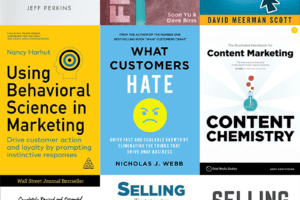Episode 49 of The Verblio Show
Rory Sutherland is one of the world’s most followed and sought after marketing thought leaders, in addition to being the Vice Chairman of Ogilvy UK and renowned author of Alchemy: The Surprising Power of Ideas That Don’t Make Sense.
On this episode, Rory shares some of the most unexpected findings from his decades involved in behavioral science research. He also offers ways we can bring more alchemy into our own work and, in doing so, open the door for innovation and inspiration we may never have known existed.
Guest-at-a-Glance
???? Name: Rory Sutherland
???? What he does: Vice Chairman at Ogilvy & Mather. Author of Alchemy: The Surprising Power of Ideas That Don’t Make Sense.
????️ Find Rory on the web: Ogilvy | LinkedIn | Twitter
???? Get smart: “If you over-quantify what success means and you design efficiency around only what you already know, you become over-optimized on the past.”
Top Takeaways
People aren’t perfectly logical ????
In his book Alchemy, Rory shows the myriad of ways in which traditional logic and economic theory completely fail to account for human behavior. What does that mean for marketers? “If you try and persuade people by using conventional logic, it’s like writing software for the wrong operating system,” he says.
One example Rory gives is from consulting with KFC in South Africa. To combat low sales, he suggested raising prices. Why? Because he saw that most people went to KFC for one of two reasons: for a bargain or for a treat. When the price was neither cheap nor luxury, it didn’t appeal to either of those mindsets.
If you’re too wedded to conventional economic wisdom, however, you might dismiss raising prices as crazy without realizing there’s more at play in human decision making than simple supply and demand—and it doesn’t always make sense.
Save the (rogue) bees ????
Rory describes the “rogue bees” who fly to unknown territory—often returning to the hive empty-handed—rather than making the same trip over and over to familiar flowers, as most bees do. “The discovery of a new nectar patch can be worth a thousand times an individual bee journey to collect nectar from an individual flower,” he explains. “So that [rogue bee’s] journey is probabilistically extremely valuable over time, but their individual journeys look wasteful.”
If those hives were like most businesses, the rogue bees would be fired for under-producing long before they had a chance to discover a new flowerbed. This tendency towards optimizing and efficiency may mean better numbers in the short term, but it removes any possibility for unexpected innovation and its accompanying growth in the future. Or, as Rory says, “If you always do the same thing in the same way with the same people, you never get a chance of being lucky.”
Episode Highlights
Why ‘best practice’ is a myth
“One of the best things I ever heard on best practice is that, ‘It’s wrong on two counts because it’s static and it’s singular.’ What you should be seeking for is better practices, not best practice.”
Lessons from direct marketing
“[Direct marketing] fostered my love of behavioral science, because time after time you’d find highly unusual results when you tested two pieces of creative work. What made a difference to the response rate usually had very little to do with what the product was or what it cost, and you very rapidly realized that people were using heuristics and other mental tools to decide what to buy and what not to buy.
For example—you won’t be old enough to remember this—you’d always say, ‘Reply within the next 28 days to receive this offer.’ Now it was, to be absolutely honest, a bit of a porky pie because if someone had replied 50 days afterwards, you still would have taken their money and supplied the product. But by creating scarcity—in other words, ‘Only four seats left at this price!’—you always got a much higher response rate than if you just said, ‘Hey, write to us anytime you feel like it.’”
Targeting isn’t marketing ????
“Over-targeted advertising is a fundamental mistake. It’s almost a contradiction in terms because some part of advertising is what Nassim Taleb would call ‘fat tails.’ Part of the reason you’re advertising is not just to find customers whom you know exist already, but to find out who else is out there, who you don’t know about.
…The job of marketing ultimately is to sell at full price, products to people who didn’t even realize they wanted what you have to sell. And selling at a discount, slightly sooner, to people who already wanted your product anyway is perfectly valid—it’s overcoming inertia, that’s perfectly reasonable—but it’s not the whole task of marketing, by definition in fact.”
Playing golf with one club is insane
“Once you admit psychology into your tool kit, then the number of ways of solving a problem goes up exponentially. This is why government is such a mess, because they only look to lawyers and to economists to solve everything through legislation and through the incentive mechanism. That’s like playing golf with one club, you know. It’s utterly insane.”
Innovation vs. marketing
“Innovation and marketing are fundamentally the same thing. By which I mean, there are two ways you can create new value in the world: One is to find out what people want and work out an ingenious way to provide it, and the other way is to work out what you provide and find an ingenious way to make people want it.”
Progress comes from imagination + persuasion ????
“You could watch chimps for years and you’d never see two chimps cooperating to carry a log. To do that requires two things before you can perform that action: Imagination, which is, ‘What if we both lifted the log? And persuasion, which is to get the other chimp to join you in your venture.”
Rory’s prediction for the future of medicine
“I think we’ll soon reach a point where personalized medical advice as opposed to personalized medicine becomes a much, much bigger thing. And that’s useful because you’re no longer asking people to do things which benefit the average without benefiting them at all, because an average is ultimately a composite of lots of different individuals. And the best way to improve average health is to improve lots of people’s health individually.”
The problem with government
“Government suffers cause it doesn’t have a marketing function. Government does not have a group of people who look at problems through the consumers’ own eyes, as experienced over time. They look at people in aggregate, and there are certain problems you can’t solve at the aggregate level. You can’t solve for the average.”
Top Quotes
????️ Rory:
“If you do anything counter-intuitive and it doesn’t work, the extent to which you get blamed for it is 10 times greater than if you do something seemingly logical that doesn’t work.”
“If you over-quantify what success means and you design efficiency around only what you already know, you become over-optimized on the past.”
“If you always do the same thing in the same way with the same people, you never get a chance of being lucky.”
“No one’s got a budget for solving a problem they didn’t realize they had.”
“Facts are surprisingly unpersuasive when it comes to human behavior.”
“In many cases, enforced treats may have a higher perceived value than the cash equivalent, even though you could spend the cash on a treat.”
“There are far more good ideas out there that you can post-rationalize, than there are good ideas you can pre-rationalize. Pre-rationalization gets everybody to the same place.”
“One of the problems we have is that businesses experiment too little and cost cut too much.”
“Almost every really good idea has required a huge amount of persuasion first.”
“I’m not interested in PhDs. That’s spending two, three, years knowing too much about too little in my book.”
Learn More
Hear more of Rory and many of the other names he mentions at Nudgestock, “the world’s leading festival of behavioural science & creativity.”



